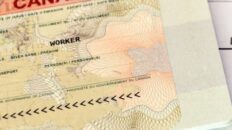Working abroad is not only a great experience, but it can also boost your professional career internationally and open doors worldwide; but what to do to work abroad … Your linguistic knowledge and intercultural skills will skyrocket, along with all other social skills. Simply put: if you have the opportunity to work abroad, do it! To help you prepare, we have compiled some things you have to consider, aspects to investigate and questions to ask yourself.
1. What to do to work abroad
Find out about visas and work permits.
Therefore, the first step will be to find out what papers you need to be able to work legally in another country and what you need to get those papers. You have to keep in mind that getting a visa or a permit will require time and money. You also have to know how long you can stay in the country with those documents; Are they related to work or can you stay there for a certain time anyway?
2. Know the cost of living and wages
You may not know exactly how much you are going to charge per month, but you have to know the industry average and compare it with the cost of living.
3. Find out how to look for work and home
Everything may be easier if you are flexible about the city where you go to work, but you will still need work and accommodation.
4. Check how much leisure time you will have
It may not seem very important at first, but find out how many days off (and due to illness) you will be entitled, as this can change a lot depending on the country. Your adventure plans will fall apart if everything is going to be work and you can’t travel, so make sure you have time (and money) to know the place.
5. Start creating a network of contacts
Luckily, you don’t need to travel to socialize and chat with other people. Asking people for help, advice or their opinion is a good way to open doors, so you can start participating in Twitter and LinkedIn, join groups or forums and talk to expatriates and people in the country.
6. Find out about the country and its culture
Everything is wonderful when you are on vacation. We don’t want to put up with the party, but living in another country can be something different: there will be expenses, taxes to pay and delayed buses. You may also live somewhat further from the beach than you had imagined. Ok, we are not saying that everything will be worse, we just want you to be realistic and not judge your future home as if it were a vacation spot. It’s a good idea to visit him before moving in and wonder if you could live there. It is also a good time to meet potential companies (if only to create contacts), search neighborhoods and talk to local people about the work situation and current living conditions.
7. Find out how to get a job
Each culture has a different way of approaching the job search, in some a somewhat more formal approach is used with a lot of paperwork and in others, personal interaction is preferred.
8. Learn to write CVs and cover letters
Now that you know how to look for work, you have to have everything ready to start the process: learn all about the design, content, and formalities that must be taken into account when writing a resume and a cover letter for that country and sector concrete. Make sure you know what personal information you have to include and what documents or references you have to attach.
9. Find out about diplomas and certificates that can be requested
Depending on your studies, knowledge and work experience, you may be asked in your host country for additional diplomas or certificates (of languages). Research the requirements for the position and find out how, where and when you can get the necessary documents. (This means that you may have to spend some time and money on getting them.) If you need a certificate of your English level, the EFSET test can be a good way to start.
10. Prepare to live in different situations
We have to mention this anyway: you have to prepare yourself mentally, because you may feel a cultural shock, or that you miss your home or your country. And you will ask yourself questions like “But why?”, For which the only answer is “Because that’s how it is.” It can happen to all of us, so you have to see it as a sign that you are growing and becoming a unique person, and seek the good memories that will last the rest of your life.
11. Have a plan B (just in case)
Well, we do not want to tear down your projects, but to travel the world it is always better to have an alternative strategy in case things do not go according to plan. For example, it is good to know how much time you can afford financially and how long they allow you to be in a country without a job. That said, it is important that you calculate how much money you have to have saved as a reserve fund for difficult times.
12. Throw yourself :
If not now when?



